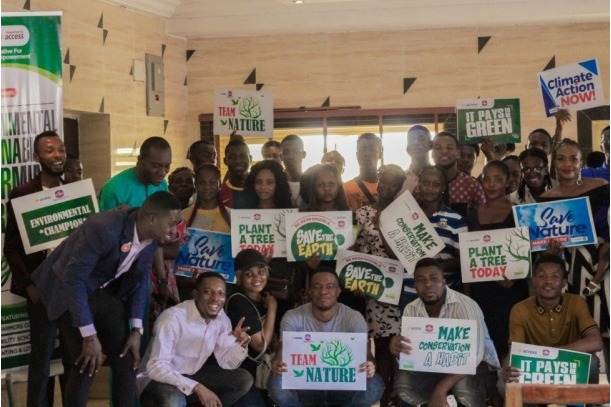Access Bank supporting innovation and sustainable agriculture

Summary
Access Bank continues to show its commitment to innovation to help address social, environmental and economic challenges.
Achieving the Sustainable Development Goals (SDGs) by 2030 is critical to tackling the urgent environmental and economic challenges facing the world. It will also help in averting potentially long-term catastrophic events. But progress towards achieving a more economically inclusive and socially equitable world in nine years' time is slow. In fact, countries like Nigeria are behind the curve on SDGs.
One thing is clear: Nigeria and other developing countries can make significant progress with innovation and become competitive in the global SDG race with the right innovation approaches. The fact that innovation is critical to advancing the SDGs is a theme that has been echoed over the years in the development and finance community.
This is because conventional poverty and hunger eradication programmes; standard strategies for providing universal healthcare and education, limiting global warming and accessing financing for the SGDs have not been helpful in meeting development targets. For this reason, Access Bank Plc is leveraging its innovation culture to develop and support various solutions and initiatives that are increasing SDG impacts in Nigeria and across Africa.
For example, the bank has pioneered and invested in several technology-driven initiatives and startups through its tech accelerator, the Africa Fintech Foundry (AFF). One of the bank's own financial technology (fintech) solutions is AccessAfrica, a payments solution that enables efficient and effective transfers between Person to Person (P2P), Business to Business (B2B), Person to Business (P2B), and Government to Person (G2P).
The bank is backing two new sustainability initiatives. One is poised to catalyse more fintech innovations to accelerate sustainable development and the other is aimed at driving sustainable food production.
Fintech-based hackathon for achieving SDGs
Last month, Access Bank partnered with Financial Centre for Sustainability, Lagos (FC4S Lagos), the Nigeria Climate Innovation Centre (NCIC), and AfricaHacks to unveil the Naija SDGs Hackathon. The hackathon challenge, which is supported by the Office of the Vice President of Nigeria, will bring together young computer programmers and other tech enthusiasts across the country to build innovative solutions in various areas, including payments, financial inclusion, security and privacy.
The fintech-based solutions will be evaluated based on how they facilitate and support the achievement of SDGs in Nigeria. Research by CGAP, a Washington DC-based think tank, provides a link between financial inclusion and development. Access to financial services helps to boost financial inclusion; digital financial services provide users with greater security and privacy over their money. These services are also an effective way of reducing poverty.
Those eligible to participate in the hackathon are Nigerians between the age of 18 and 35. Registration for the competition is from February 15 to March 15, 2021, while the competition itself will commence on March 25. According to a statement sent to Financial Nigeria by Access Bank, the organisers will also create Youth SDG Laboratories to enable budding fintech talents to proffer solutions for the actualisation of SDGs in the country.
Speaking on the hackathon initiative, Head of Sustainability at Access Bank, Omobolanle Victor-Laniyan, said, "For us at Access Bank, sustainability is at the core of our business processes, and we continue to seek innovative ways to scale up sustainability in our business and in the communities where we operate."
According to Ms. Victor-Laniyan, the bank recognises the partnership with the various institutions as another opportunity to leverage Nigeria's human capital to develop world-class solutions, while providing a platform for young people to hone their talents. Participants in the competition can win over N30 million in prizes and various benefits.
Promoting awareness on sustainable agriculture
One of the areas in which Nigeria has fallen behind in terms of the SDGs is the zero-hunger agenda. Goal 2 of the SDGs seeks to end hunger and all forms of malnutrition, and also achieve food security by 2030. But hunger in Nigeria is still at a serious level, per the Global Hunger Index (GHI), an annual report co-published by Concern Worldwide and Welthungerhilfe. The 2019 GHI ranks Nigeria 93rd out of 117 countries.
Part of the huge challenges for the country involve how to feed people sustainably and achieve food security. In commemoration of the World Soil Day (WSD) 2020 – which held on December 5 – Access Bank organised a programme aimed at promoting awareness on sustainability in agriculture and farming practices. The programme was hosted in partnership with Glow Initiative, a Lagos-based non-governmental organisation tackling problems like unemployment, poor electricity access and climate change in communities. The WSD takes places annually as an advocacy for the sustainable management of soil resources.
Access Bank and Glow tagged its sustainable agriculture programme, Soil Conservation Education Programme for Sustainable Farming (SCEP-SF). Sustainable agricultural practices are innovation-based activities designed to protect the environment, converse the use of natural resources like water, land, soil nutrients, and sunlight, and minimise soil degradation.
Apart from minimising greenhouse emissions, sustainable agriculture also entails the establishment of climate-resilient practices to protect crop and livestock production systems against the effects of floods, drought, diseases and other disruptive events. Hence, the need to provide awareness and educate Nigerian farmers on the importance of sustainable agriculture cannot be overemphasized.
Access Bank said the SCEP-SF programme held in Enugu State, Nigeria. Activities that took place during the programme involved the ‘Young Farmers Connect’ training programme and an environmental sustainability awareness school tour.
Tree planting exercises were also carried out in schools. In terms of the programme’s reach, over 800 students and farmers were reached. Information, education and communication (IEC) materials on soil conservation were distributed in the communities.
Related
-
Green economy to surpass $7 trillion in annual value by 2030 – WEF
Since 2010, the cost of solar photovoltaics and lithium batteries has fallen by around 90% and offshore wind by 50%, making ...
-
PUMA showcases products from recycled materials in push for 3Rs
Through its RE:COLLECTION range, PUMA is demonstrating its commitment to the 3Rs – Reduce, Reuse, and Regenerate ...
-
Re-innovating for sustainability
At Bilaad Realty, our strategy is aligned with achieving the SDGs, which provide a comprehensive framework for targeting ...










